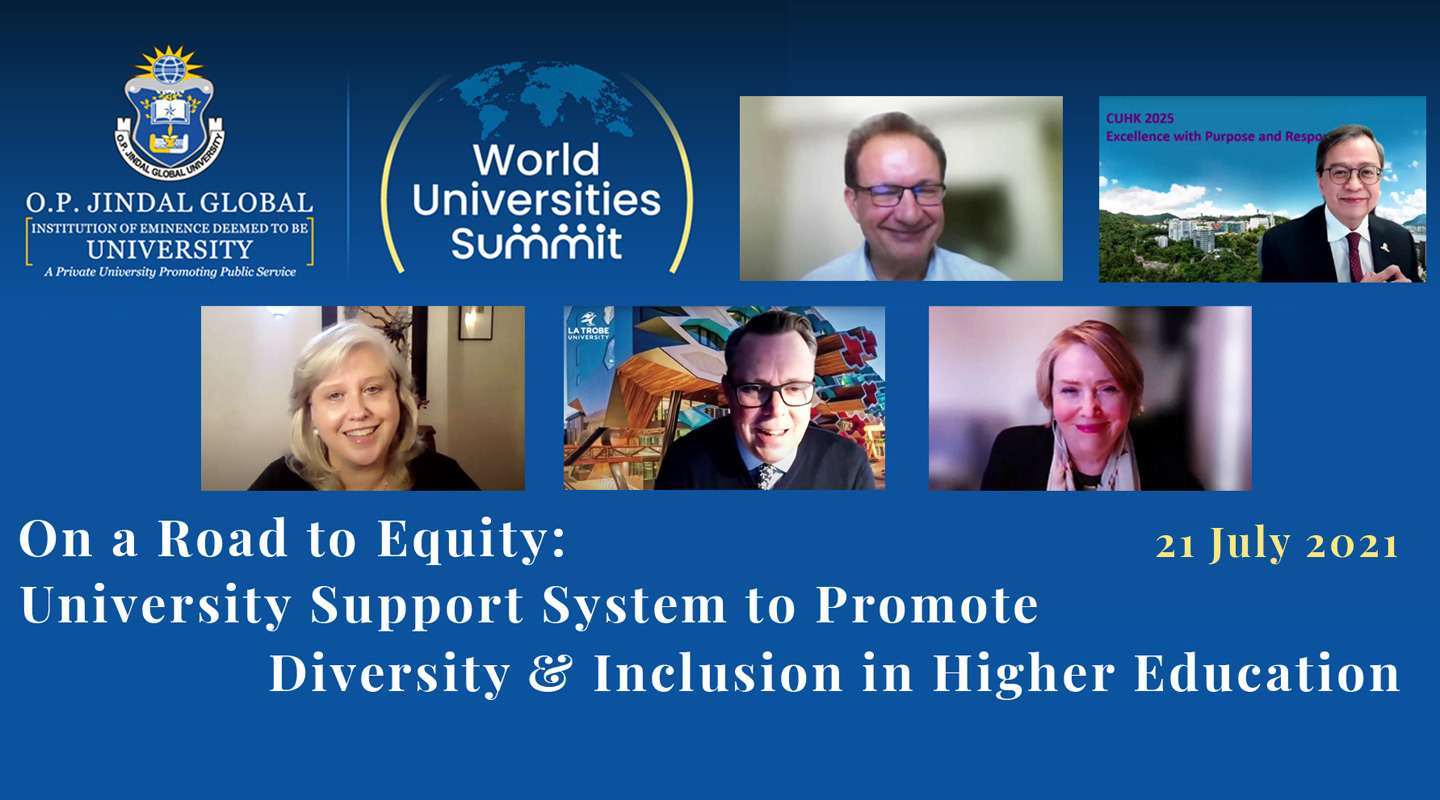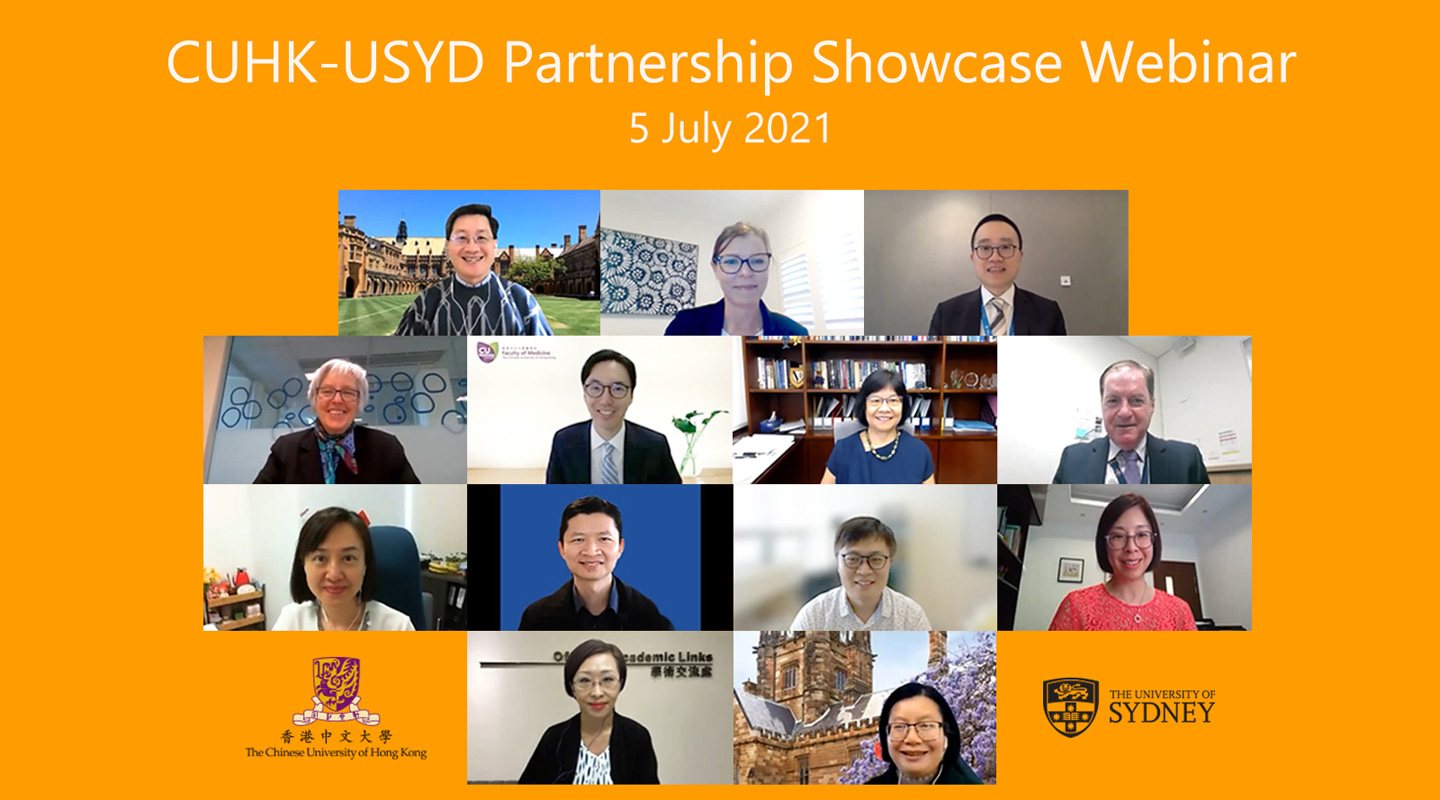Dear readers, With the launch of e-newsletter CUHK in Focus, CUHKUPDates has retired and this site will no longer be updated. To stay abreast of the University’s latest news, please go to https://focus.cuhk.edu.hk. Thank you.
Summertime’s Meeting of Minds
Revisit a summer packed with ideas on future campus, diversity and inclusion, and collaboration across borders

As the pandemic continues to ruffle the world and ground the flights, academics and administrators of CUHK refuse to stay furloughed—while good old times of real conferences marking the prime of summer are no more, members of the University remain in the international fold to address issues facing universities in an increasingly open and fluid world. How campuses may look, ways to push for equity and why collaboration matters in research were some questions considered. Below is a recap of the virtual itineraries—and the sparks in them.
Reimagine Campuses of the Future
How important is the university campus? Before the pandemic, campuses seemed to be at the heart of the university experience. But national lockdowns and the pivot online have left many universities reimagining their physical spaces. In a dialogue hosted by The Association of Commonwealth Universities concerning the future of the campus, Vice-Chancellor Prof. Rocky Tuan expressed his view that being on a university campus is a formative experience for students. For 18-to-22-year-olds, attending university means being in the company of a high concentration of people who are in the same age group, are going through similar biological and social changes, and are all actively searching for personal goals and aspirations in life. Removing the physical campus would seriously compromise this experience and put our youngsters at a disadvantage.
Professor Tuan observed that, as do other teachers, some courses are easier to translate to online delivery, while other subjects, such as chemistry, require practical and hands-on instructions and interactions which cannot always be replicated online.
‘We need to think twice about building very large halls to accommodate thousands of students, but we need to keep important facilities such as dormitories to allow students to truly experience university life,’ he said.
The Vice-Chancellor also highlighted the importance for universities to uphold equity, access and inclusion in higher education and to ensure the underprivileged are not deprived of education opportunities.
‘For us who are running universities, this is our job. We have to make sure that no one is left behind.’
He projected that universities will be seeing more students in their forties or fifties, who are ‘empty nesters’ seeking new opportunities or those undergoing career changes. Universities have to think creatively to cater to the needs of a different group of students, whether it be campus facilities or the type of education they offer.
Diversity and Inclusion Matters

In an increasingly open world, respect for or even relishing of differences and creating a level playing field for all has taken a primary place in the cartography of education. What calls for reimagining is not just the physical campus but the substance and modus operandi of university education. At the World Universities Summit hosted by O.P. Jindal Global University in India in late July, Provost Prof. Alan Chan shared the CUHK experience at the panel ‘On a Road to Equity: University Support System to Promote Diversity and Inclusion in Higher Education’.
Professor Chan related how a University-wide Diversity and Inclusion Policy was adopted in 2020 to consolidate and enhance existing initiatives, with a new office set up to spearhead diversity and inclusion at the University. To champion diversity and inclusion, a Steering Committee was formed, which he chairs, signaling the importance and commitment of the University to promoting diversity and inclusion. ‘Diversity and inclusion is a core value of the University and has been a part of CUHK’s ethos since our founding in 1963,’ he said.
The University is particularly concerned about the underprivileged. ‘We make sure students from grassroots families have access to high quality education regardless of their family financial circumstances,’ added Professor Chan. CUHK integrates the value of diversity and inclusion in education and research, in addition to removing barriers and enhancing accessibility to education.
The University has taken care of students with special learning needs as it moved its teaching and learning activities online during the pandemic, so that they would benefit from the teaching as their classmates did.
Two is Better than One—What Working Together Takes

July also saw the Office of Academic Links and The University of Sydney (USYD) organize a public webinar to showcase joint research on diabetes, information engineering, and integrative medicine. Academics from both institutions also shared experiences and tips in building and sustaining global partnerships.
Speakers from CUHK included Prof. Ronald Ma of the Department of Medicine and Therapeutics, Prof. Alexander Lau of the Hong Kong Institute of Integrative Medicine, and Prof. Chen He of the Department of Information Engineering. They were joined by USYD scholars including Prof. Anthony Keech and Prof. Alicia Jenkins of the NHMRC Clinical Trials Centre, Dr. Josiah Poon of the School of Computer Science, and Prof. Ouyang Wanli of the School of Electrical and Information Engineering.
The speakers concurred that common goals and aligned research interests are key to successful collaboration.
‘My work with USYD on high-performance wireless systems draws on CUHK’s expertise in system building and USYD’s strength in theories. The tools and resources provided by USYD help accelerate our progress,’ said Professor Chen.
Professor Ma highlighted open and regular communication in a partnership. ‘Building successful collaborations requires much support, commitment and communication. Frequent contact is vital. We should be open to each other about the challenges and difficulties that we might have.’
Pooling young talents is a facet not often acknowledged but nonetheless vital in joint research effort. Professor Ouyang explained why it would do good to both research and researcher. ‘When you don’t have enough resources and grants because you are new, seek collaboration so you can find more interesting research topics and leverage the profound expertise of your collaborators. When you lack experience in research, seek collaboration and advice from senior researchers who will be able to provide lots of help.’
A panel discussion was chaired by Prof. Sham Mai-har, Pro-Vice-Chancellor (Research) of CUHK towards the end, where she discussed the value of international partnership and how difficulties in working together could be overcome.
‘International collaboration helps expand your existing research to cover new areas, angles, perspectives, and applications that you will otherwise not think of or be able to access. International collaborations do elevate research achievements,’ she said.
The webinar attracted 70 participants from 19 universities and organizations, bringing the summer feasts of ideas to inspiration and action.
Edited by amyli@cuhkcontents with information from Office of Academic Links